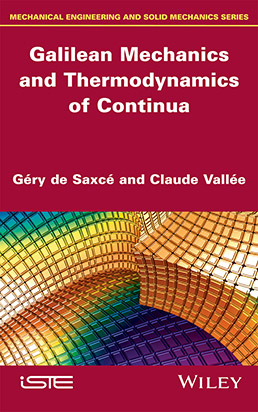
This title proposes a unified approach to continuum mechanics which is consistent with Galilean relativity. Based on the notion of affine tensors, a simple generalization of the classical tensors, this approach allows gathering the usual mechanical entities mass, energy, force, moment, stresses, linear and angular momentum in a single tensor.
Starting with the basic subjects, and continuing through to the most advanced topics, the authors’ presentation is progressive, inductive and bottom-up. They begin with the concept of an affine tensor, a natural extension of the classical tensors. The simplest types of affine tensors are the points of an affine space and the affine functions on this space, but there are more complex ones which are relevant for mechanics torsors and momenta. The essential point is to derive the balance equations of a continuum from a unique principle which claims that these tensors are affine-divergence free.
1. Galileo’s Principle of Relativity.
2. Statics.
3. Dynamics of Particles.
4. Statics of Arches, Cables and Beams.
5. Dynamics of Rigid Bodies.
6. Calculus of Variations.
7. Elementary Mathematical Tools.
8. Statics of 3D Continua.
9. Elasticity and Elementary Theory of Beams.
10. Dynamics of 3D Continua and Elementary Mechanics of Fluids.
11. Dynamics of Continua of Arbitrary Dimensions.
12. More About Calculus of Variations.
13. Thermodynamics of Continua.
14. Mathematical Tools.
15. Affine Structure on a Manifold.
16. Galilean, Bargmannian and Poincarean Structures on a Manifold.
17. Symplectic Structure on a Manifold.
18. Advanced Mathematical Tools.
Géry de Saxcé is Professor at Lille 1 University – Science and Technology, France.
Claude Vallée was Emeritus Professor at the University of Poitiers, France.